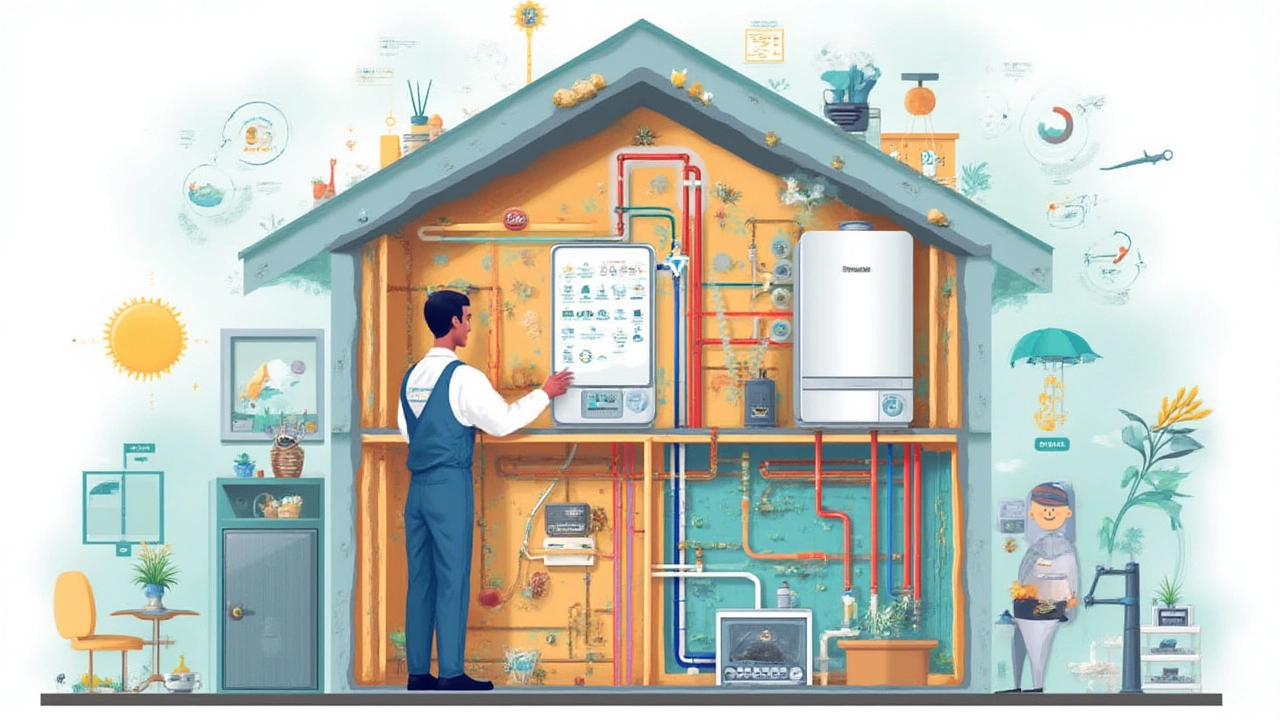The average homeowner expects their appliances to chug along reliably for decades. Yet, boilers are the unsung workhorses—the beating heart of many homes, especially here in Wellington where winter creeps up suddenly and sticks around. Some folks never think about their boiler until it coughs, splutters, or just dies on them during the coldest snap. So, how long does a boiler really last? Not as long as you’re hoping—unless you look after it like your car or your health. You might be surprised by what actually determines a boiler’s lifespan, what’s a myth, what’s non-negotiable, and how your next coffee break could save you thousands in repairs or replacements.
The Real Lifespan of a Boiler: More Than Just a Number
Ask ten people how long a boiler should last and you’ll probably get ten answers—anything from seven years to the magical thirty. The truth is, the average modern boiler lasts around 10 to 15 years. Most warranties nudge up against that number: Worcester Bosch, for example, clocks its guarantee up to 12 years if you register it and keep up maintenance. Older boilers built like tanks in the eighties or nineties sometimes keep going for over 20 years, but they guzzle energy, are harder to fix, and parts are often discontinued.
Why the big range? Well, boilers face different worlds. A boiler in a well-maintained Wellington home will outlive one stuffed away in a leaky closet and ignored for years. Hard water (packed with minerals) beats up your heat exchanger faster, and oversized boilers cycling on and off constantly wear out fast. It’s not just about the number of years; it's about hours of use, how well it’s installed, the water quality running through it, and what you throw at it feature-wise. A combi-boiler working flat-out for a family of six will age much quicker than a traditional boiler ticking along for a couple living quietly.
If you want a boiler to see its teens, there’s one simple rule—annual servicing. This isn’t just ticking a box for the warranty. A good engineer will flush out sludge, check pressure, and spot leaks before they become disasters. The Federation of Master Builders says, “Boilers can last up to 15 years, but only if you service them regularly and react quickly to any warning signs.” Ignore this and you might be shopping for a new boiler a lot sooner and in the cold.
| Boiler Type | Average Lifespan (Years) | Common Issues |
|---|---|---|
| Combi Boiler | 8-12 | Heat exchanger, pump, pressure valves |
| System Boiler | 10-15 | Expansion vessel, leaking pipes |
| Conventional Boiler | 12-20 | Corrosion, inefficient operation |
If your boiler's approaching ten years old, you’re in what engineers call the “pay attention zone.” You might notice odd noises, strange smells, leaks, or just higher energy bills. All of these are your boiler’s way of saying it’s not as young as it used to be and needs a bit of love—or possibly replacing altogether.
What Really Wears Out a Boiler Fast?
Sure, boilers are tough. But they’re not invincible. The sneakiest culprit for a short boiler life? Neglect. Skipping yearly servicing is like never changing the oil in your car—something’s going to give, and usually when you need it most. Limescale is the main villain for folks living in hard water zones (hello, wider Wellington region!). Limescale crusts up your heat exchanger and slows waterflow, so your boiler has to work harder, gets hotter, and, over time, cracks under the pressure—literally.
Leaks are another fast track to boiler doom. Even small leaks, ignored, let air and water in where they aren’t wanted. That rusts the internal parts, shoots dirt through your pipes, and gunks up your radiators. If you open the airing cupboard and see even a drip, get it checked before it turns into a flood.
Pressure’s a small thing that makes a big difference. Boilers operate within a Goldilocks zone—too little and the system shuts off; too much and safety valves keep blowing. Constant pressure swings are grinding internal components, weakening joints and seals. If you keep having to top up pressure every few weeks, it’s a sign something’s not right, and a professional should take a look.
Then there’s the new tech: modern boilers have digital boards and sensors to keep things efficient. But these boards can fail from power surges or dampness caused by bad venting. Older analog boilers didn’t have this problem, but their “efficiency” was laughable by today’s standards—many only converted 60% of gas into heat versus 90%+ in current models.
What about the house itself? Poor insulation means the boiler runs more often, racks up run-time hours, and wears out years faster. Likewise, a badly designed heating system with airlocks or radiator sludge forces the boiler to work overtime. Some customers don’t realise that keeping their system clean with a regular chemical flush can add years to boiler life and keep heating bills down.
“Over 70% of boiler breakdowns are caused by dirty, sludged-up systems. A simple powerflush can fix this and prolong boiler life,”—Heating and Hotwater Industry Council (UK)
To sum up: neglect, bad water, pressure problems, leaks, and poor system design are the usual suspects behind early boiler replacement. Stay ahead of these and you might get lucky with a boiler that outlives the warranty sticker.

Keeping Your Boiler Running: Maintenance Tips That Actually Work
If you want to stretch those last years out of your trusty boiler, regular check-ups are your best friend. Don’t just rely on an annual tick-box visit—keep eyes and ears open for the signs of trouble between check-ups.
- Boiler lifespan hinges on the annual service—schedule it without fail.
- Bleed your radiators every few months. Trapped air forces your system to work harder and can spike your bills.
- Check for leaks, even minor ones. Fix them early to avoid rust and prevent major breakdowns.
- Keep the area around your boiler clear. Boilers need room to vent heat. A cramped cupboard can make things overheat and fail early.
- Water pressure should sit between 1-2 bars (your manual says where). Regularly dropping pressure signals a leak somewhere—call in a pro.
- If you’re in a hard water spot, fit a scale reducer or get your engineer to add a chemical inhibitor at each service.
- Listen for weird noises—banging, gurgling, or whistling usually signals trapped air or limescale buildup.
- Set a calendar reminder for servicing; life’s busy, but boilers don’t forgive forgetfulness.
- Insulate your pipes before winter to avoid frozen pipes (and unexpected cold showers).
A regular chemical flush, done by a pro, keeps the insides of your system cleaner, stopping the dreaded ‘kettle noise’ and reducing wear and tear. For turbo-charging your maintenance game, fit a magnetic sludge filter. This handy device traps metallic sludge before it clogs up your heat exchanger and radiators—and many modern installations now include them as a standard.
Some insurance plans cover annual boiler servicing and emergency repairs. It’s worth considering if you’re risk-averse or have an older system. But check the small print: they often won’t cover boilers past a certain age or with pre-existing faults.
If your energy bills have started creeping up, and you’re not heating more rooms than last winter, your boiler could be losing efficiency—a classic sign that end of life is near. Have an engineer do a combustion check and consider setting aside a replacement fund.
When to Replace: Signs Your Boiler is Done, and What to Look for Next
No boiler lasts forever—eventually, replacement makes more sense than patching up repairs. Signs it’s time to plan a swap-out? Frequent breakdowns, rising repair bills, odd noises that even the best engineer can’t explain, and energy bills that eat into your Friday night pizza budget.
If your boiler is ten years old or more, and you’re dealing with 2-3 callouts per year, it’s probably time to replace. Another red flag is when you start hearing, “can’t get that part anymore” from your servicing company. That’s code for: technology has moved on, and you could be without heat for weeks if something major goes wrong.
Upgrading to a modern condensing boiler brings real benefits—higher energy efficiency (up to 98% for the best models), quieter operation, and smarter controls with apps that let you set schedules or fire up the central heating as you leave work. Look for models with long warranties and brands with good reputations for parts and support.
When choosing your next boiler:
- Don’t oversize. Get a free heat loss survey—an oversized boiler cycles too often and wears out quicker.
- Check the water hardness; invest in a limescale filter if you’re in a known trouble spot.
- Ask for a magnetic system filter.
- Budget for a full system flush with installation—it sets up your new boiler for long life.
- Read reviews not just of brands but of local installers. A bad install jobs cut years off a brand-new boiler’s lifespan.
Some local authorities and energy providers (in the UK and New Zealand) offer boiler grants if you’re upgrading from a really old system, especially if you install high-efficiency models. Worth checking before you part with cash.
Your boiler is the engine room of your home. Treat it with a bit of respect and regular attention, and it’ll run quiet, efficient, and hassle-free for years. Ignore the warning signs, and you could end up cold, frustrated, and shelling out for a replacement at the worst possible time.

I am an expert in the services industry with a focus on appliance repair. My passion lies in understanding how things work and educating others in simple, engaging ways. This enthusiasm fuels my writing, where I delve into topics around appliance maintenance and troubleshooting. I aim to make these subjects clear and accessible to all readers.